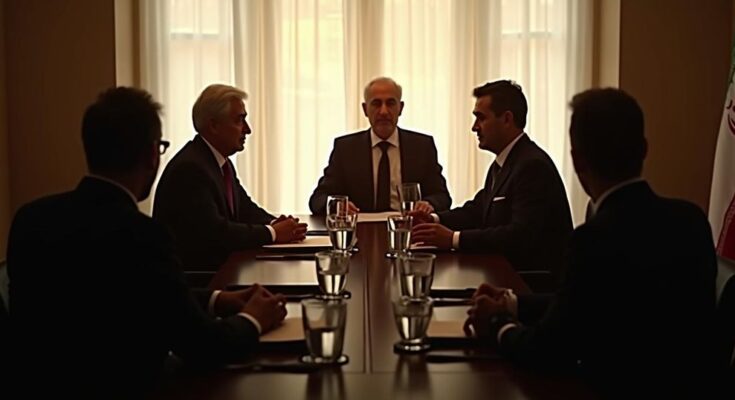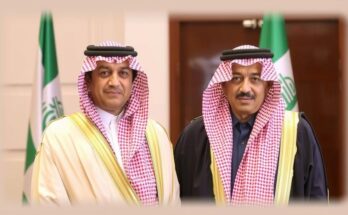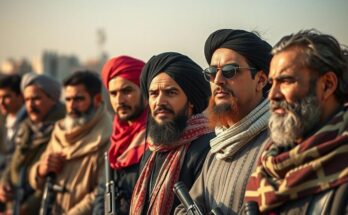Iran’s Foreign Minister Abbas Araghchi visited Beirut following Iran’s missile strike on Israel. His discussions with Lebanese leaders occur amidst signs of improved relations between Iran and Gulf states, particularly Saudi Arabia, as they seek to stabilize regional dynamics while managing the fallout from ongoing military conflicts. The situation remains dire, with a rising death toll and humanitarian crisis affecting civilians in Lebanon.
On Friday, Iran’s Foreign Minister, Abbas Araghchi, arrived in Beirut following a substantial missile strike by Tehran against Israel. This visit occurred shortly after Israeli airstrikes targeted areas near the Lebanese capital’s airport and amidst ongoing tensions resulting from the assassination of prominent Hezbollah figure, Hashem Safieddine, during an Israeli raid in southern Beirut on September 27. During his visit, Araghchi is expected to engage in discussions with Lebanon’s caretaker Prime Minister Najib Mikati and Parliament Speaker Nabih Berri, who is allied with Hezbollah. Simultaneously, a diplomatic summit in Doha, Qatar, witnessed dialogues between Iranian and Gulf leaders, indicating a potential warming of relations between Iran and its regional counterpart, Saudi Arabia. In a related meeting, Iranian President Masoud Pezeshkian expressed Iran’s eagerness to bolster ties with Riyadh, highlighting the significance of overcoming differences to foster cooperation. Saudi Foreign Minister Faisal bin Farhan reciprocated these sentiments, emphasizing Riyadh’s desire to mend relations and focus on resolving bilateral issues. The Gulf Cooperation Council, comprising nations like the UAE, Bahrain, Saudi Arabia, Oman, Qatar, and Kuwait, has reportedly assured Iran of their neutral stance regarding the Iran-Israel conflict, particularly as Saudi Arabia remains cautious of potential threats to its oil infrastructure following past attacks. Iran’s recent missile assault on Israel is reportedly a response to prior assassinations of key figures, including Hezbollah’s leader Hassan Nasrallah and Hamas’s Ismail Haniyeh. In response, Israeli officials have signaled an intention for significant retaliation against Iranian assets. Meanwhile, Iran has communicated warnings to the United States through intermediaries, asserting that its counterattacks would be aimed only at aggressors. Supreme Leader Ali Khamenei addressed supporters in Tehran, defending the missile strike on Israel as a justified response to ongoing Israeli aggression. He asserted the rights of nations to defend themselves against perceived tyranny, condemning Israel’s actions as divisive among Muslim nations and reiterating a unified stance against shared adversaries. The ongoing conflict has escalated, with casualties from Israeli actions around 1,974 victims, including many civilians. Concurrently, the Israeli army reports losses among its personnel in clashes with Hezbollah forces. The humanitarian crisis continues to worsen, with shelters in Lebanon filled to capacity as civilians flee from violence.
The recent flurry of diplomatic activity is set against a backdrop of escalating tensions in the region due to military confrontations between Iran and Israel, particularly Hezbollah’s involvement in the conflict. The Iranian strike signifies a pivotal moment as part of Tehran’s retaliation strategy following significant losses and territorial threats. The GCC’s expression of neutrality is notable given the historical animosities and threats surrounding the Iran-Israel dynamic, reflecting a complex balance of regional interests. The humanitarian implications of the military actions in Lebanon further complicate the geopolitical landscape, drawing concern from international observers and human rights organizations.
The geopolitical landscape surrounding the Iran-Israel conflict is becoming increasingly complex, characterized by heightened military actions and diplomatic overtures aimed at de-escalation. Iran’s missile attacks represent its determination to respond to perceived aggressions, while simultaneous diplomatic engagement showcases the possible thawing of relations between Iran and Gulf states. However, the humanitarian crisis stemming from ongoing conflicts remains a pressing concern, highlighting the urgent need for comprehensive solutions and dialogue to secure lasting peace in the region.
Original Source: www.middleeasteye.net




